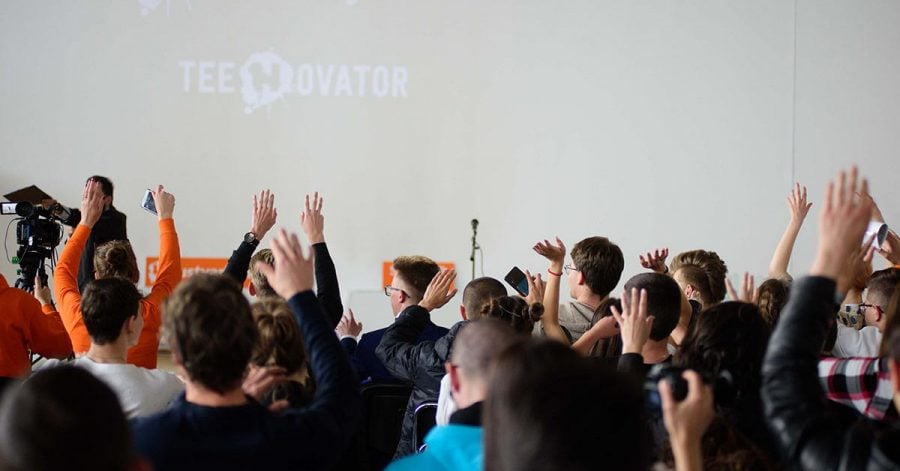“Any time is a good time to start a company,” says Ron Conway, the legendary early-stage investor of Silicon Valley, who has backed some of the most successful startups in history, including Facebook and Google.
Entrepreneurship among students has a significant economic and social impact because their ideas will bring both financial and intangible values needed in the future. Global initiatives such as The GUESSS Project (Global University Entrepreneurial Spirit Students’ Survey) have recognized the benefit of researching students’ entrepreneurial intentions and activities in more depth in order to make sense of the context and identify the growth opportunities. The last report which was in 2018 surveyed 208K students from 54 countries to obtain insights on the global state of student entrepreneurship. It found some intriguing data: only 9% of university students intended to become founders directly after their studies, and a central pattern among them was the “first employee, then entrepreneur” attitude.
No matter the country or the region, there is one universal influencing factor that plays an important positive role in the development of student-driven entrepreneurship and that is startup non-formal education and the startup and business climate.
Focusing on Bulgaria, in particular, according to a statement of the EU Commissioner on Innovation, Research, Culture, Education and Youth, Mariya Gabriel, less than 10% of Bulgarian students show intentions of developing their own business, compared to the average 25% in Europe. Similarly, the last Global Entrepreneurship Monitor (GEM) report highlights that the group of 18-24-year olds has a lower participation rate than the group of 25-44-years old and that overall the country has a smaller share of early-stage startups in the knowledge-intensive industry compared to other EU countries.
Even though these statistics may not seem the most optimistic ones, the fact that they have been improving over time indicates that youth entrepreneurship in Bulgaria is succeeding despite the odds. The Recursive wants to showcase who are the drivers and enablers of student-led innovation, what is their perspective on the development of the local student startup ecosystem, and what do they perceive as the key challenges and opportunities for growth.
Bridging the gaps between education and entrepreneurship
Being around for 23 years, Junior Achievement Bulgaria (JA Bulgaria) is one of the organizations which has a lot to do with the development of the youth entrepreneurship landscape in the country. The organization introduces modern and innovative entrepreneurial programs in universities and high schools and provides acceleration support to student-led startups. The impact of the organization is also visible when looking at the success of the alumni – the social entrepreneur Boris Kolev is the only European part of the Global Business Hall of Fame, while Kristiyan Mihaylov now chairs the Bulgarian Professional Association of Robotics and Automation (PARA).
“Education does not only happen in the form of a course and curriculum – the development of the entrepreneurial culture, attitude, and especially mindset is the most relevant and suitable approach for young people to fit into the modern world and be able to deal with all the challenges of uncertainty, instability, unpredictability in the volatile world,” Milena Stoycheva, CEO of JA Bulgaria, told The Recursive.
Аccording to her, the development of youth entrepreneurship should be viewed in a much wider spectrum. Оn one hand, it is about building an attitude and behavior. Оn the other hand, it is about nurturing a particular way of thinking, and lastly, it is about developing the set of skills that are characteristic for every entrepreneur.
That is why the mission of JA Bulgaria is to develop entrepreneurship as behavior and self-expression from a young age. Milena Stoycheva shares that JA Bulgaria develops its programs based on the 8 Key Competencies in Education approach of the European Commission, one of which is Entrepreneurship and Proactiveness. “On top of developing concrete entrepreneurial skills and financial literacy, which are crucial for the practice of entrepreneurship, we want to teach young people to learn and study in an entrepreneurial manner,” she says. This involves learning soft or as Milena calls them “core” skills as they are essential for the professional realization of young people in the new economy.
Responsibility-taking and a desire to experiment, as being able to perceive every error as a lesson learned instead of a failure are some of the core skills that Milena Stoycheva points at. “In addition having a growth mindset and being able to see challenges as an opportunity for learning and development instead of as inhibitors, and having a flexible thinking which allows students to look at their past experiences from a different perspective, enables them to uncover valuable insights, use them to make the next step and bring themselves and their ideas to the next level,” Milena Stoycheva remarks. Because we live in an environment of infinite information, critical thinking and critical evaluation are also key abilities that would help students build a mechanism to sift through all of the available data.
All of these qualities and skills are elements of the entrepreneurial way of thinking, so it is natural and reasonable to introduce them in education. According to Stoycheva entrepreneurship should be taught in schools and universities as a way through which people realize their business activities, but also as a form of personal development and self-realization.
The educational model of JA Bulgaria encourages the participation of businesses in entrepreneurial education and consists of three main areas – education entrepreneurship, financial literacy, and employability skills. The organization has become part of the educational system for high schools and universities and offers programs for students from the 1st grade. Milena Stoycheva highlights that building an entrepreneurial mindset and culture is a process that needs years of progressive development and consistency and cannot happen through a single instance. That is why JA Bulgaria develops the models of an education company which is all about learning by doing,” says Stoycheva.
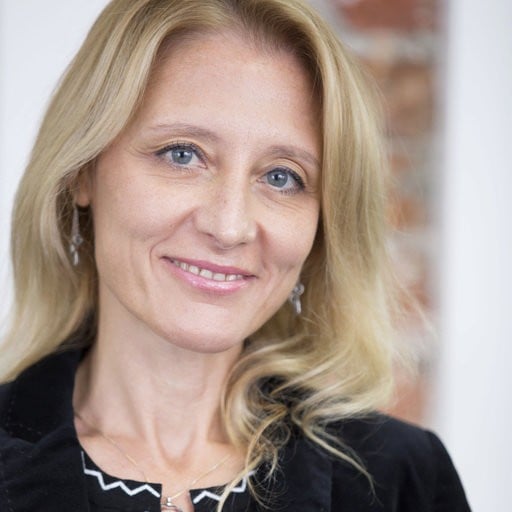
From inspiration to transferring business knowledge
In order to bring students from the classroom to the business world, various pre-accelerator programs, and startup initiatives bridge the gaps between post-high school university education and the actual startup ecosystem. Milena Stoycheva comments how JA Bulgaria and its Beyond pre-accelerator provide young visionaries with a chance to taste the founder’s life: “At the basis of our pre-accelerator, there are three main pillars: the community element, the educational element, and tech or science-driven ideas. We work with a multidisciplinary approach and create an ecosystem that allows people to meet like-minded individuals and build strong teams. Moreover, we focus on providing mentorship for relevant startup education and getting everyone from a team on the same page. And lastly, we have the belief that in order to create a successful startup, teams need to have a real tech or scientific basis for their ideas. That is why Beyond is not strictly focused on building a startup but rather on building an MVP and learning how the innovation process works.
The winner of this year’s pre-acceleration program, Wasteful, combines all of these three elements and stands out with its science-based solution which transforms low-grade non-recyclable plastic waste into superior composite pavements. Having a goal to reduce pollution and create a product that outperforms its existing harmful alternatives on the market, the team of Wasteful won a €2.5K prize and was selected to participate in the European Competition Gen-E 2021. Up until now Marta Mihailova, Ivan Borov, Alexander Nikolov, and Alexander Parvanov have developed 3 prototypes and are currently in the laboratory R&D phase. In the next year, they will continue doing tests on their prototypes with the ultimate goal to obtain certifications and go into the semi-production stage when we will be able to begin the small-scale commercial manufacturing of our products.
“Having a team with different perspectives and expertise is the key element that can turn an idea into a reality. No matter how good a product or an idea might be, its realization depends solely on the composition and synergy of the team,” Ivan shares. The main ways that Beyond helped the team of Wasteful was by helping them form a strong team and providing them with mentors who helped them test and improve their ideas. “During the program, we were provided with enough time and support which made us feel less stressed and more focused on working on the development of our business,” Marta adds.
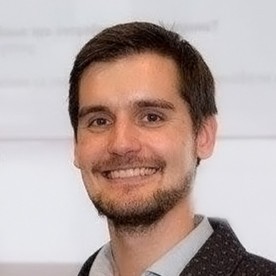
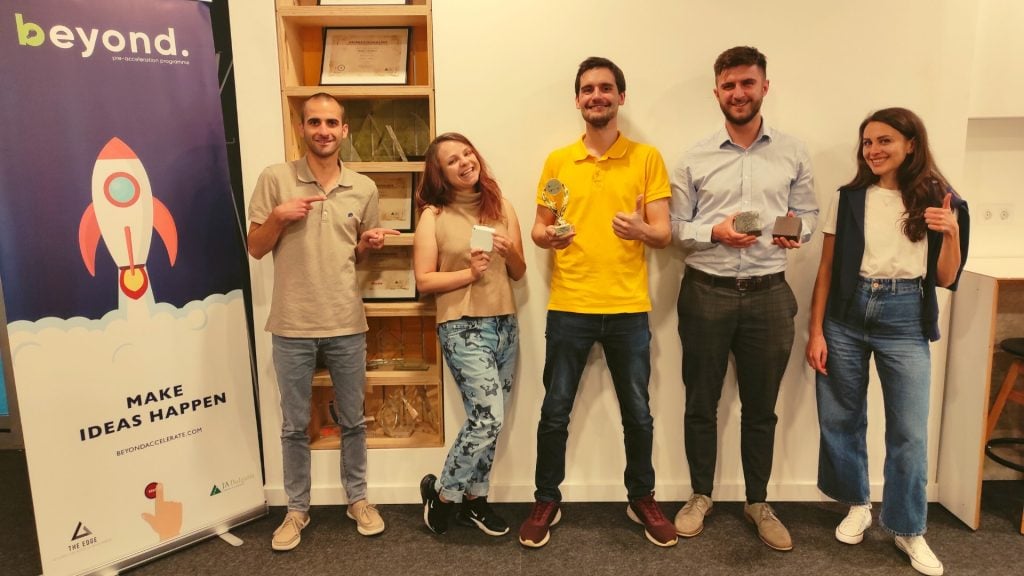
Making the first steps in the shoes of a founder
Teenovator is another hands-on program that links business and education by matching 10th and 11th graders and mentors from the business and startup ecosystem. For the three years since its start in Bulgaria, the initiative has had a total of 500 participants, out of which around 400 have completed the whole program.
Veronica Racheva, Manager of Teenovator, and Zornitsa Mitkova, the Public Relations Manager and Community Manager of the program, share that the key “Teenovator effects” that aid the development of the early-stage entrepreneurial ecosystem are the value added to the educational framework and the creation of a long-lasting connection between students and the business community. “We already see people from our community, both mentors and participants, who keep returning to our events and who continue their relationships after the end of the program,” the Teenovator team explains. According to Racheva, the program allows students to discern what are the real innovation demands in the business world and how to match ideas with real needs. She also shares that the idea of creating such a program in Bulgaria came from the realization that there was a gap in the ecosystem and even though three years ago there were idea incubation and acceleration programs for university students, there was not a corresponding model for high-school students.
By using the Stanford method of design thinking and tailoring it to the needs of the local environment, Teenovator teaches high schoolers how to be real team players. It encourages them to bond with their mentors and to challenge themselves to go outside of their comfort zones and develop a sense of self-initiative. “In the previous seasons when the program was held in-person we challenged the students to go on the street and get the maximum amount of refusals from strangers. This exercise aimed to show the young founders that there is nothing scary about failure and to help them become more empathetic and humble,” Racheva says.
Like JA Bulgaria, Teenovator aims to break the stigma around failure instilled in the mindset of young Bulgarian students and even selects mentors who have also experienced failure at some point in their professional paths.
When it comes to the impact of the program so far, the team of Teenovator gives examples with the success stories of participants – EduBots, which develops training packages for educational robotics continues developing its business, and even won an investment from Innovation Starter’s acceleration program, Innovation Academy.
The winners of the latest season, ICEPRO, who have created sugar-free and protein-rich ice cream are currently negotiating with investors for the financing of their first batch.
Beloslava Malakova, who is a co-founder of SafePeak – the runner-up team of this year’s program that develops app for the quick localization of people lost in the mountains, shares: “The skills that Teenovator taught us are how to work in a team and how to apply our knowledge in the real world. It helped us network and build a better connection with each other in our team. The abundant business advice and insights that we were given would save us a lot of errors and trials and will allow us to avoid the mistakes of people before us.” She says that on the individual level, the Teenovator experience helped her develop in many aspects of life thanks to the interactions with the mentors. From a business perspective, she outlines that the most valuable lessons were realizing the importance of having a personal drive and being persistent, as well as being surrounded by the right people and having role models. In terms of the obstacles along the way, she adds:
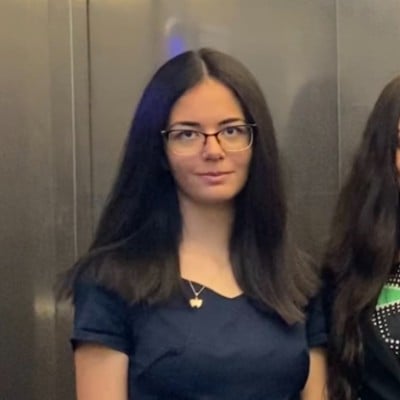
The steps forward: enablers and investors
Besides the existing programs which operate outside or in parallel with the educational system, universities play a key role in nurturing and incubating the rising startup talent in Bulgaria. More and more universities in the country, such as The American University in Bulgaria,The New Bulgarian University, and VUZF University have started developing business programs with courses focused on entrepreneurship and innovation management. In addition to the official educational framework, local universities also support the development of various organizations, initiatives, and pre-accelerator programs such as StartUP@Blagoevgrad and Elevate, which allow young people to put their business knowledge in practice and connect with the entrepreneurial community.
And how about the investment landscape and the readiness of local VCs and business angles to support the early-stage risky ideas of student entrepreneurs? Stefan Brumov, who was on the Expert Board that drafted the latest Entrepreneurship Monitoring report on Bulgaria has commented that most of the investments are targeted towards already growing companies which leaves young starting founders with limited options for financing. He believes that VCs tend to focus on startups that have already gone through the riskiest stages of their development and have already built well-working and profitable business plans. Another important ecosystem factor is that there are many international IT companies that recognize the quality of the local tech talent and open their R&D offices in the country, and despite the existence of centers for digital and tech innovation students and young professionals are rarely determined to go the extra mile and develop their own product or service.
This does not mean that there aren’t outliers and young visionaries who succeed in attracting the interest in VCs despite the odds. Take, for example, Lyubomir Yanchev, the founder and CEO of MClimate who started developing his idea for an IoT smart home device when he was only 17-years-old as part of the National competition of the Ministry for Education and Science “Young Talents”. A couple of years later, his startup has raised a total of €1.5M from equity investments and from various funding programs.

